Esteemed bassist talks about his Austin days, working with Leonard Cohen, and current projects
Exclusive interview with FBPO’s Jon Liebman
August 2, 2021
It’s hard to describe Roscoe Beck’s career as anything short of remarkable. The New York native originally made a name for himself in the Austin scene of the 1970s, playing alongside the Eric Johnson and the Vaughan brothers, and winning acclaim with his jazz fusion band, Passenger. Beck later relocated with the group to Los Angeles, where they hit it off with Leonard Cohen. They would go on to play on Cohen’s 1979 album, Recent Songs, and began touring with him in ’79. In L.A. Beck would also meet Robben Ford, with whom he would collaborate frequently during the 1980s and beyond. Over the years, he’s also worked with the likes of the Dixie Chicks, Jennifer Warnes, Darden Smith, Oz Noy and the Toshiko Akiyoshi/Lew Tabackin Big Band. Beyond his work as a bass player, Beck is also a composer and producer. His debut solo album Walk On was released in 2005.
FBPO: How did you become a bass player?
RB: I actually started on drums. My father was never a professional musician, but I think in his youth he had really wanted to be a big band drummer. We didn’t have a drum set, but he bought a snare drum and a hi-hat, and I worked out on that for a little bit. My older brother was into folk music, and I was into Chuck Berry and all of the pre-Beatles rock and roll. I wanted an electric guitar, but my brother talked me into buying an acoustic guitar in ’63. My first memory of hearing the Beatles was reaching for my guitar, which barely played at that point. I was picking out single notes and really simple chords. My brother had a great record collection, but he didn’t play. So I started teaching him and he got good pretty quick. And I said, “Hey, one of us ought to play bass.” So in ’67, I went out and bought myself a Japanese hollow body bass. My brother had started playing bass at that point, but eventually, he went to college and took my bass along with him, so I was without a bass for a while. Then, during my senior year in high school, I was living with a guy who was a jazz guitarist and we’d often invite another friend who was an excellent jazz guitarist over. So there’d be three of us in the room wanting to play guitar, and inevitably they had me on bass.
FBPO: It sounds like you were equally proficient on the bass and the guitar.
RB: Well, growing up in the mid ’60s, radio was definitely the thing. And Motown was happening even before The Beatles. I’d be riding in the car with my dad, a Chevy, and the bass just seemed to be the thing coming out of that one mono speaker. I always tuned into the bass, but I continued to play guitar through high school. When I went to North Texas State, I registered as a guitarist. Of course they didn’t have a jazz guitar teaching program at that time, it was classical. So I started classical guitar and upright bass at the same time at North Texas.
FBPO: When you say upright bass, you mean classical? With the bow?
RB: Yep. I guess the defining experience for me, though, actually happened when I was 17 and going to high school in Austin, Texas. I walked into a music store one day and there was an upright bass on a stand in the window. I had been listening to jazz heavily, probably since the age of 14. Miles, and Coltrane, and Wes Montgomery were probably my favorites right there, but heavily into jazz when I was 17. And I walked into this music store and there was an upright bass there. And I just went over and probably fingered a G on the low E string or something. And just played that one note and went, “I can sound like that?” I thought I was Ron Carter the first time I touched one. It was just like, “Oh, that sound!” I had played electric for three years at that point, but that was a revelation to me because I was listening exclusively to jazz at that point. I had tuned out of the rock and roll scene. Blues and jazz.
FBPO: You did the opposite of what most career-bound musicians did. You started in out in New York, then you left. What took you from Poughkeepsie, New York, to Austin, Texas?
RB: It was the family. My dad was from Poughkeepsie. My mom was from East Texas. It was a classic World War II story. They met at the USO when my dad was stationed in Texas. And they married, and of course moved to New York where my dad was from. But my mom was always trying to get us back to Texas, and when I was 14, she finally succeeded. It was definitely not in my plans. Being from Poughkeepsie, I had already planned my life out. I was going to finish high school, move to New York City. That was my plan. But they derailed it.
FBPO: So you already knew you wanted to go into music?
RB: I had planned to become a professional musician all along. I was into it from a very early age. I really never considered anything else. I had multiple bands up in Poughkeepsie. And by the time I was 14 and left Poughkeepsie, I had counted 20 bands I had already been in, rock bands. Just before we left Poughkeepsie is when my brother started bringing home really good jazz albums and it really turned me around. Blues albums also, bringing home Junior Wells with Buddy Guy and that sort of thing, which I really loved. And Howlin’ Wolf, Chess Records, all of that, but also jazz. And getting into the jazz thing, I just thought, New York is the place to go. And that was my plan, but they derailed it at 14. Moved to Texas, and once I got there, I was looking for an escape basically.
FBPO: How’d you end up in Austin?
RB: I kept hearing Austin. Austin is the place to go. And so I left home after my junior year of high school and made my older brother my legal guardian so that I could go to high school in Austin where he was living. I was actually touring a three-state area by 15, in a top 40 band. Everybody else was in their 20s, and I was 15.
FBPO: Austin’s got quite a rich musical heritage. It’s very different from New York City though.
RB: Oh, yeah. I had this plan. I was going to go to New York City and become a jazz musician, hopefully a studio guy. When we moved to Texas, I kept hearing Austin. So I went to Austin and started hearing things there that influenced me. Actually, became aware of Jimmie Vaughan when I was 17. I used to go out, hear him every Monday night. Stevie hadn’t arrived yet. He was still in Dallas. But Jimmie Vaughan. Then I started hearing about this guy Eric Johnson, even when I was 17. I didn’t meet him yet, but I heard about him.
FBPO: You arrived at a great time.
RB: Yeah. And then I decided to get serious. I went to North Texas State for two years. Then I missed Austin and decided to come back here and go to UT instead, University of Texas. And as soon as I came back, I was 20, and I think the first week I was back in Austin, I met both Eric Johnson and Stevie Ray Vaughan in the same week because as soon as I hit town, I asked a friend, I said, “Okay, what’s going on in town?” And my friend said, “Well, Jimmie Vaughan has a new group now called The Fabulous Thunderbirds.” And I said, “Okay, I’ll check that out.” And he said, “Oh, and do you know his little brother, Stevie?” And I said, “No, I didn’t know he had a brother.” And he said, “Oh, you got to check him out. He moved here from Dallas, and he’s really good. Some people say he’s better than Jimmie.” And I was like, “Oh, okay. I’ll check that out.” And I said, “What else is going on?” He said, “Well, there’s this group called The Electromagnets led by a guy named Eric Johnson.” And I was like, “Okay, I got to check that out.” So my first week in town, I was just going to hear everybody.
FBPO: It sounds like you blended in pretty quickly.
RB: I ended up at a jam session with Stevie. We actually met on stage at a jam where we were just called up at the same time. And we hit it off and had a wonderful friendship right up until he passed. And I met Eric. I went out to hear The Electromagnets, and I thought they were fantastic. And after they quit, I was introduced to Eric. Somebody introduced me to him, and said, “This is Roscoe Beck. He just came from North Texas State.” And that seemed to interest Eric. And he was like, “Oh, let’s get together and play.” And I was like, “Absolutely.” And it really started right then with Eric. So we’ve been working together since we were 20. And Stevie and I maintained our friendship. I used to sit in with him all the time. And once I had a group, I had my first jazz group, as it were, called Passenger. Stevie used to come sit in with Passenger all the time. So, yeah, Austin was an amazing, thriving place in the ’70s when nobody had record deals. Fabulous Thunderbirds didn’t have a record deal yet. Stevie didn’t have a record deal. Eric didn’t have a record deal. We were club rats, but we were learning all the time.
FBPO: What took you to LA? It sounds like the scene in Austin was pretty happening.
RB: Well, it was happening. But like I said, nobody had record deals and there were no record companies in Austin.
FBPO: This would have been around what year?
RB: Mid ’70s. And the scene was fantastic. I loved it here in the mid ’70s. It was so much fun. We played all the time, every night of the week. Had gigs all the time. Got a lot of session work for jingles and things like that. But I also knew that that was as far as you’d go in Austin if you didn’t get out. By the time I went to University of Texas, my playing on the upright was strong enough and my reading was good enough to finally go out for the jazz band. All of the members of Passenger came out of the jazz ensemble. We were all in the jazz ensemble and all really good musicians. And everybody wrote original material. We started recording after our jingle sessions. The studio owner would grant us time, and we started recording our original material.
FBPO: How did you end up relocating to LA?
RB: Here’s where it really turns into a story! We had all this original material, and it’s now late ’70s, I guess around ’78. We had a lot of original material we had recorded professionally, 24-track analog in those days. And in ’78, I made my first trip to LA and just started dropping off cassette tapes at record companies, which you would think wouldn’t amount to anything, but believe it or not, we ended up getting interest from three major labels, from Capitol, Warner Brothers, and Chrysalis. And suddenly, we had major labels flying to Austin to hear the band. And we thought, “Oh. Well, this is how it happens then, right?” We knew we were going to get signed, which by the way never happened. But what did happen was, sometime in ’78, a musician friend of mine, a guitar player named Randy Cobb, came through town on tour and dropped in the club where Passenger was playing, and loved what he heard, and wanted to hang out afterwards. So I invited him over to my place, and he was like, “You guys got tapes?” And I was like, “Yeah, sure. Here.” And I gave him a cassette.
FBPO: And…?
RB: And maybe a month later, my phone rang, and it was a man named Henry Lewy, who was Joni Mitchell’s producer at the time. Produced everything she ever did up until she married Larry Klein, I guess. But he did all the early records, the classic records, Blue, and Hissing of Summer Lawns. Hejira, with Jaco and Don Juan’s Reckless Daughter, and all of that. And all of that was out by ’78. Of course by then, Jaco was on the scene too. And like everybody else, he was blowing my mind. My playing was changing as a result. But this fellow, I gave him the cassette tape. He went out to LA and was working a demo session out there with Joni’s producer, and during a break, he said, “Hey, I heard this band in Texas,” and played them the tape. And the next thing I knew, Henry Lewy called me and said, “Would you guys be interested in working with Joni?” And I was like, “Heck, yeah!” because Jaco was doing all the recording with Joni at that time. So Henry said, “Well, look…” He said, “I can’t promise you anything.” But he said, “I like your band.” And he said, “I’d like to produce your band.” He said, “Would you mind if I shopped this tape around?” And I was like, “Please do.” And he said, “Well, I’ll try to get you a deal, and I’d love to produce you.” And he said, “I think you would be a great band for Joni.” So we just packed up three or four cars, and drove out to LA and got a hotel on Sunset Boulevard, and waited for Henry to call us. Joni was working at A&M Studios making the Mingus album at the time.
FBPO: I remember it well!
RB: And we met Joni, and she was very kind, very nice, but I don’t think she had in mind what Henry had in mind. He thought we’d be a great road band for her, and of course she wanted to keep Jaco and Pat Metheny and Don Alias. And she did. She made the Shadows and Light thing. Henry was producing Joni’s Mingus album, but happened to also be producing Leonard Cohen at the same time. And he liked my playing because it sounded like Jaco, to be honest. And so, he called me one day for a session with Leonard Cohen, and the session went well. We played a couple of songs and recorded a couple of things on the spot that went on his record he was making. At the end of the session, Leonard turned to me and he said, “That was really nice. Let’s do it again.” And Henry Lewy said, “Well, he has a whole band, you know.” And Leonard said, “Well, next time, bring them all.” And so, that’s what happened.
FBPO: That is a great story.
RB: Passenger finished the record with Leonard. His record was about half done at that point. Abe Laboriel Sr. had been playing bass on the record, but we got to finish it. We did the second half of the record. And then, Leonard asked us to go on tour with him that fall, ’79.
FBPO: So the Passenger band was now Leonard’s band?
RB: Yeah. Plus a Russian violinist, plus, an Armenian oud player.
FBPO: Whoa.
RB: Plus, singer Jennifer Warnes, who had a hit on the radio at the time but agreed to go out as a background singer. Such was her respect for Leonard. Jennifer also found the second background singer, Sharon Robinson, who, like myself, remained with Leonard from that day until the day he passed away.
FBPO: You were with Leonard for a long time. How would you like him to be remembered?
RB: I think as he will be remembered, a fine poet. I’m obviously biased, but I think he’s the finest songwriter of our generation, bar none. And I mean no disrespect to Bob Dylan because without Bob Dylan, I don’t think there would have been a Leonard Cohen. I think Bob Dylan showed Leonard Cohen what was possible. But Leonard was already a published poet. His first book came out in 1955. Once Leonard saw the folk scene happening in the early ’60s, he went, “Oh, I can do that.” He was already writing serious poetry, so he started writing songs. But I worked with him from ’79 right up until his passing, I just saw tremendous growth in those years. When I met him, he was a pretty basic folk singer with incredible lyrics. But he actually grew as a musician, to where he was writing just incredible music by the end of his life. Even Bob Dylan acknowledged that. Bob Dylan, at an event where Leonard was, once said to Elizabeth Taylor, “Let me introduce you to a real poet,” and took Elizabeth Taylor over to meet Leonard Cohen.
FBPO: How about today? What’s keeping you busy these days?
RB: Working with Eric Johnson, recording with him, and also co-producing a female artist named Hattie Webb, who was one of the singers on the very last Leonard Cohen tour. We started in 2019, but I went on the road with Eric at the beginning of 2020. Actually left on New Year’s Day to go on tour. And we were on tour until the middle of March when everything shut down, obviously, so at that point, I came home. Fortunately, through the pandemic, I had something to work on because we had cut all of these tracks with Hattie Webb and there was much work left to be done. Then I started doing remote sessions, sending tracks out to California for Vinnie Colaiuta to put drums on, or Lenny Castro to put percussion on. Sent one song to Barcelona, to a couple of the guys who were also on the Leonard Cohen Band. Hattie and I haven’t been able to get together since 2019 because of the pandemic, but we’ve been finishing the record long distance. We’re in the mix stage now.
FBPO: Tell me about your gear.
RB: Well, I’ve got a lot of basses and they all get used. With Eric Johnson, I might use anything from a Hofner, to a Jazz bass, to a Sadowsky. I had a signature bass with Fender for several years, 4 and 5 strings, and I still use those a lot. Those would be my main basses, my signature basses. But I still find a lot of use for a good old P bass in the studio, or a Jazz bass. I often record with the upright. I’ve got a few of those. And different amps for different things. I still use a lot of Fender gear. On the road, I use Fender 8×10 cabinets, two of them. And an amp that they no longer make called a Bassman 1200, 1200 watts in a 300-watt tube version as well. I use the Fender amps pretty much exclusively for electric, although, I do have a TC Electronic that I use on some smaller gigs. For the upright, I like the GKMV150.
FBPO: What kind of strings do you play?
RB: La Bellas on the electrics. I do still have an endorsement deal with them. I used D’Addarios for years, but when I was developing my 5-string for Fender, I was trying different strings. The B string that La Bella makes just had a purity of tone that I couldn’t find in any other string. I couldn’t get around the fact that this B string La Bella made, it just smoked anything I had heard. And of course they make great roundwound strings, and they make those great flatwound strings that they’ve been making since the ’50s.
FBPO: What advice could you impart to somebody who wants to learn bass?
RB: Love of the music would be the first thing. You have to be drawn to music to begin with. For myself, I say I never really had a choice. My choice was made for me somehow. I grew up listening to the radio, and I never wanted to do anything else but music. So obviously the love of music and the passion is the jumping off place.
Listening, really listening, would be the second thing. My teachers were records. I didn’t have a teacher of any kind until I went to North Texas State, but I was a fairly decent musician by the time I got there. I listened constantly and played along with records.
I guess number three would be to remember that it should be fun. Practice is work, yes. And we must practice. We must have discipline. But onstage, I think one should really enjoy themselves. Not that it’s not serious business, it’s always serious business. But I was drawn to music because it was exciting to me. It thrilled me. And that’s the feeling I’m still looking for any time I step on a stage. It’s a privilege.
FBPO: What would you be if you weren’t a bass player?
RB: The only other passion I ever had… when I was very young, I was a good bowler. Bowling is fun, but it didn’t turn me on like music. Pro bowler? Hmm… they do have all the really cool clothes.
See Jon’s blog, with key takeaways from this interview here.
Roscoe’s solo album, Walk On, is available here:
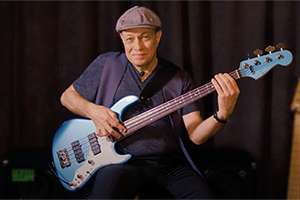
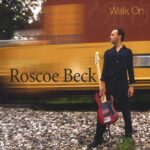
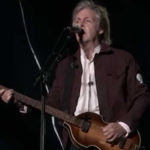
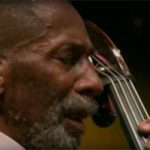
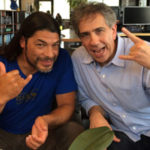
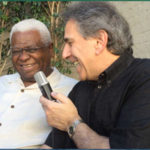
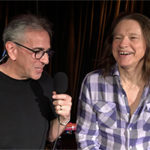
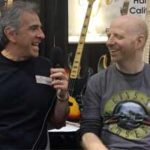

I have seen Roscoe live with Robben Ford in MelbourneAustrLia unreal loved listening to him and seeing him work his magic with ROBBEN and the drummer. Blew me and my friend away. Thank you so much Roscoe for the joy you brought to My lifere you coming back to Australia?
Interesting that Roscoe did not even mention Robben Ford in this interview. Is there a rift there? Most of my bass playing friends know of Roscoe through his work with Robben.